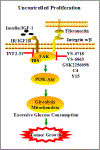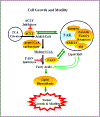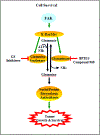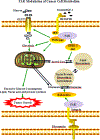The role of FAK in tumor metabolism and therapy
- PMID: 24333503
- PMCID: PMC6349254
- DOI: 10.1016/j.pharmthera.2013.12.003
The role of FAK in tumor metabolism and therapy
Abstract
Focal adhesion kinase (FAK) plays a vital role in tumor cell proliferation, survival and migration. Altered metabolic pathways fuel rapid tumor growth by accelerating glucose, lipid and glutamine processing. Besides the mitogenic effects of FAK, evidence is accumulating supporting the association between hyper-activated FAK and aberrant metabolism in tumorigenesis. FAK can promote glucose consumption, lipogenesis, and glutamine dependency to promote cancer cell proliferation, motility, and survival. Clinical studies demonstrate that FAK-related alterations of tumor metabolism are associated with increased risk of developing solid tumors. Since FAK contributes to the malignant phenotype, small molecule inhibition of FAK-stimulated bioenergetic and biosynthetic processes can provide a novel approach for therapeutic intervention in tumor growth and invasion.
Keywords: Focal adhesion kinase; Glutamine; Lipogenesis; Molecular targeting; Motility; Proliferation.
Copyright © 2013 Elsevier Inc. All rights reserved.
Conflict of interest statement
Conflict of Interest
The authors declare that there are no conflicts of interest.
Figures




Similar articles
-
Focal adhesion kinase (FAK): emerging target for drug-resistant malignant tumors.Mol Biol Rep. 2025 Feb 20;52(1):248. doi: 10.1007/s11033-025-10296-7. Mol Biol Rep. 2025. PMID: 39976799 Free PMC article. Review.
-
Focal adhesion kinase as a cancer therapy target.Anticancer Agents Med Chem. 2010 Dec;10(10):735-41. doi: 10.2174/187152010794728648. Anticancer Agents Med Chem. 2010. PMID: 21214510 Free PMC article. Review.
-
Inhibition of focal adhesion kinase by PF-562,271 inhibits the growth and metastasis of pancreatic cancer concomitant with altering the tumor microenvironment.Mol Cancer Ther. 2011 Nov;10(11):2135-45. doi: 10.1158/1535-7163.MCT-11-0261. Epub 2011 Sep 8. Mol Cancer Ther. 2011. PMID: 21903606 Free PMC article.
-
The roles of nuclear focal adhesion kinase (FAK) on Cancer: a focused review.J Exp Clin Cancer Res. 2019 Jun 11;38(1):250. doi: 10.1186/s13046-019-1265-1. J Exp Clin Cancer Res. 2019. PMID: 31186061 Free PMC article. Review.
-
Focal adhesion kinase-An emerging viable target in cancer and development of focal adhesion kinase inhibitors.Chem Biol Drug Des. 2021 Mar;97(3):774-794. doi: 10.1111/cbdd.13808. Epub 2020 Nov 27. Chem Biol Drug Des. 2021. PMID: 33191630 Review.
Cited by
-
Imidazoles as potential anticancer agents.Medchemcomm. 2017 Apr 13;8(9):1742-1773. doi: 10.1039/c7md00067g. eCollection 2017 Sep 1. Medchemcomm. 2017. PMID: 30108886 Free PMC article. Review.
-
Identification of PTK2 as an adverse prognostic biomarker in breast cancer by integrated bioinformatics and experimental analyses.Front Mol Biosci. 2022 Dec 1;9:984564. doi: 10.3389/fmolb.2022.984564. eCollection 2022. Front Mol Biosci. 2022. PMID: 36533074 Free PMC article.
-
Inhibition of integrin β3, a binding partner of kallistatin, leads to reduced viability, invasion and proliferation in NCI-H446 cells.Cancer Cell Int. 2016 Dec 1;16:90. doi: 10.1186/s12935-016-0365-7. eCollection 2016. Cancer Cell Int. 2016. PMID: 27980455 Free PMC article.
-
Polyphenolic Compounds of Crataegus Berry, Leaf, and Flower Extracts Affect Viability and Invasive Potential of Human Glioblastoma Cells.Molecules. 2021 May 1;26(9):2656. doi: 10.3390/molecules26092656. Molecules. 2021. PMID: 34062758 Free PMC article.
-
Ruthenium polypyridyl complex inhibits growth and metastasis of breast cancer cells by suppressing FAK signaling with enhancement of TRAIL-induced apoptosis.Sci Rep. 2015 Mar 17;5:9157. doi: 10.1038/srep09157. Sci Rep. 2015. PMID: 25778692 Free PMC article.
References
-
- (ECCO), T. E. C. O. (2012). Mesothelioma drug slows disease progression in patients with an inactive NF2 gene. In ScienceDaily.
-
- Ackermann M, Morse BA, Delventhal V, Carvajal IM, & Konerding MA (2012). Anti-VEGFR2 and anti-IGF-1R-Adnectins inhibit Ewing’s sarcoma A673-xenograft growth and normalize tumor vascular architecture. Angiogenesis, 15, 685–695. - PubMed
-
- Aleksandrova K, Boeing H, Jenab M, Bas Bueno-de-Mesquita H, Jansen E, van Duijnhoven FJ, Fedirko V, Rinaldi S, Romieu I, Riboli E, Romaguera D, Overvad K, Ostergaard JN, Olsen A, Tjonneland A, Boutron-Ruault MC, Clavel-Chapelon F, Morois S, Masala G, Agnoli C, Panico S, Tumino R, Vineis P, Kaaks R, Lukanova A, Trichopoulou A, Naska A, Bamia C, Peeters PH, Rodriguez L, Buckland G, Sanchez MJ, Dorronsoro M, Huerta JM, Barricarte A, Hallmans G, Palmqvist R, Khaw KT, Wareham N, Allen NE, Tsilidis KK, & Pischon T (2011). Metabolic syndrome and risks of colon and rectal cancer: the European prospective investigation into cancer and nutrition study. Cancer Prev Res (Phila), 4, 1873–1883. - PubMed
-
- Andersson S, D’Arcy P, Larsson O, & Sehat B (2009). Focal adhesion kinase (FAK) activates and stabilizes IGF-1 receptor. Biochem Biophys Res Commun, 387, 36–41. - PubMed
-
- Anichini E, Zamperini A, Chevanne M, Caldini R, Pucci M, Fibbi G, & Del Rosso M (1997). Interaction of urokinase-type plasminogen activator with its receptor rapidly induces activation of glucose transporters. Biochemistry, 36, 3076–3083. - PubMed
Publication types
MeSH terms
Substances
Grants and funding
LinkOut - more resources
Full Text Sources
Other Literature Sources
Miscellaneous

